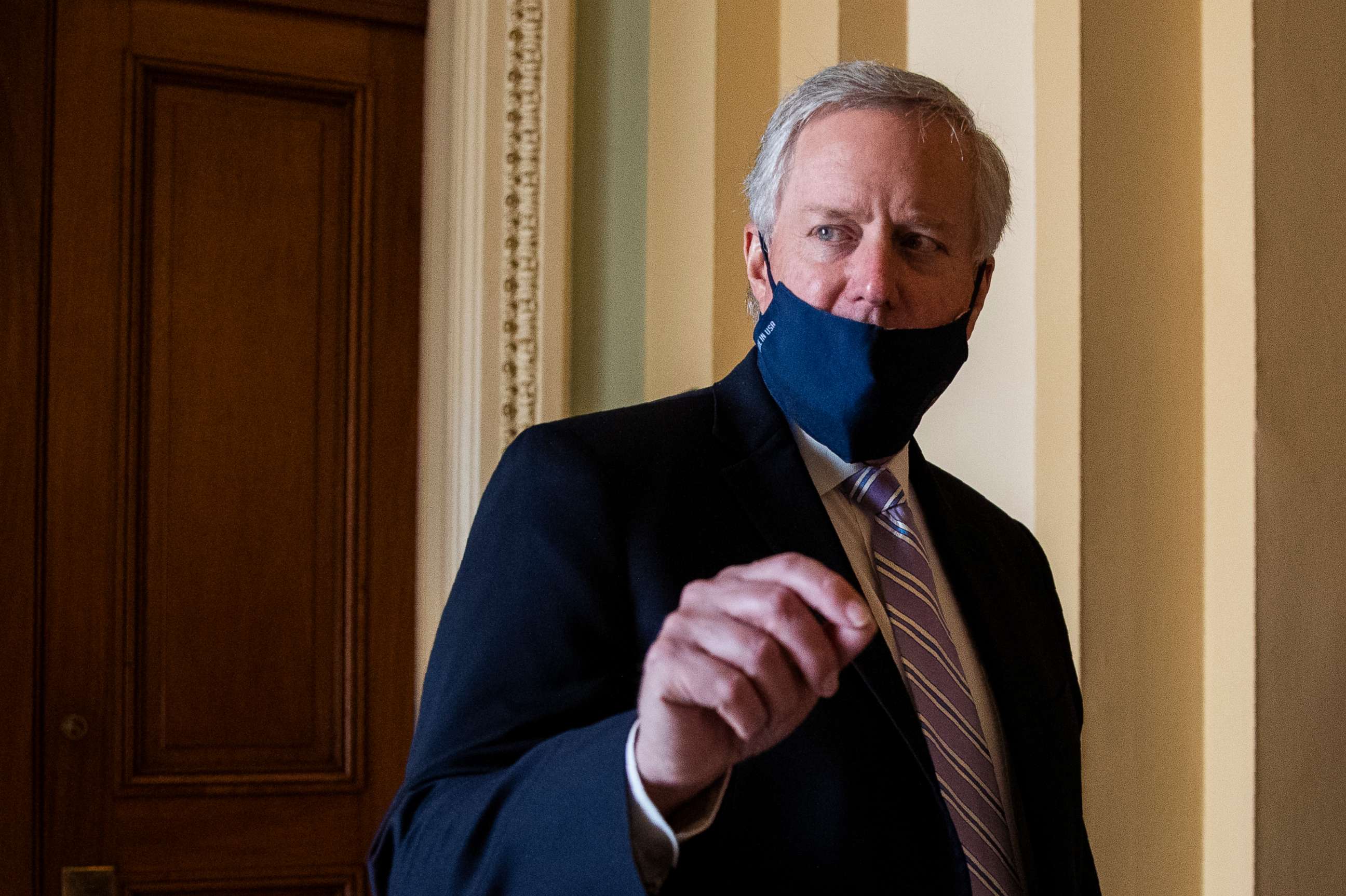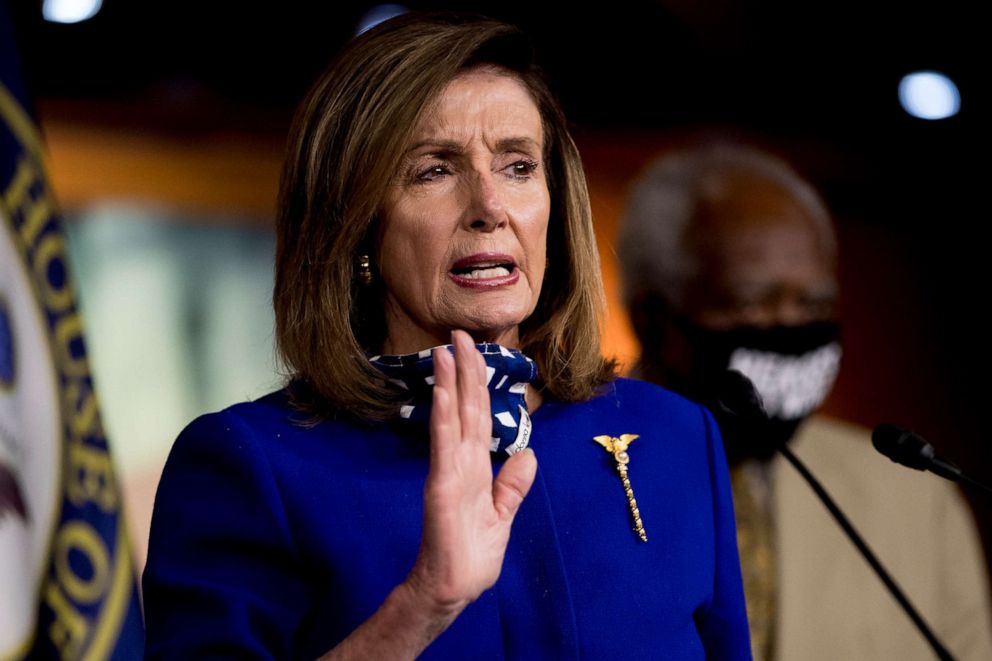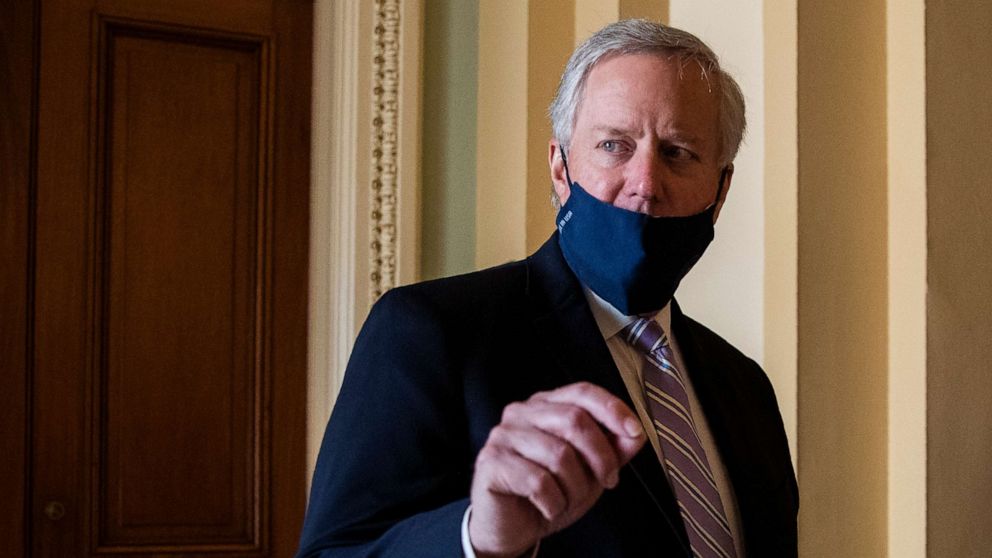Senate GOP, White House propose cutting $600 unemployment checks to $200 in coronavirus relief plan
Senate Majority Leader Mitch McConnell introduced a new coronavirus relief plan on the Senate floor after Senate Republican leaders and the White House appear to have overcome their differences.
"I hope this strong proposal will occasion a real response, not partisan cheap shots. Not the predictable, tired old rhetoric as though these were ordinary times, and the nation could afford ordinary politics," McConnell said Monday afternoon in a floor speech.
But Democrats already don't agree with the Republicans' plan, which includes a $200 flat-rate, short-term extension to federal unemployment benefits as opposed to $600 a week, a senior source familiar with the matter confirmed to ABC News, since it will take time before states' systems can shift to accommodate any federal benefit changes.
Following McConnell's floor speech, Senate Minority Leader Chuck Schumer criticized the Republican Party for "wasting precious time" in the months since Congress passed its first coronavirus relief package, arguing "the White House and Senate Republicans couldn't get their act together" in the time since.
"Ten weeks after Democrats passed a comprehensive bill through the House, Senate Republicans couldn't even agree on what to throw in on the wall," Schumer said, adding that support for the plan presented Monday is still not clear. "Not only do we not know if the president supports any of these proposals, we don't even know if Senate Republicans fully support."
Sen. Ted Cruz, R-Texas, told reporters that McConnell is about to encounter "significant resistance" to the HEALS Act --- saying the focus shouldn't be on emergency help, but on economic recovery.
"I continue to have serious concerns, certainly at the cost, as our deficits and debt are spiraling out of control," Cruz said. "But I also have concerns that the focus of this legislation is wrong. Our priority, our objective should be restarting the economy. This shouldn't be yet another emergency relief bill. We had several bills at the height of the crisis that were designed to be emergency relief bills."
Republican sources familiar with the matter told ABC News later Monday that there could be as much as half the Senate GOP conference voting against the bill.
The proposal comes as part of a broader bill aimed at handling economic fallout caused by the coronavirus pandemic.
Treasury Secretary Steven Mnuchin and White House Chief of Staff Mark Meadows spent the weekend on Capitol Hill working through details of the proposal with Senate GOP leadership staff.
"We've got an agreement in principle," Meadows told reporters late Sunday, saying that staff was still putting the finishing touches on the proposal. "We have a few modifications that we're looking for clarity on, but we've gotten those down to a handful that hopefully will be resolved in the next hour or so."
The $1 trillion plan is expected to reduce the federal unemployment benefit to about $200 per week, on average, or 70% of the wages a worker earned before ending up jobless. It would also provide $105 billion for schools, $70 billion of which would go to K-12 institutions with more going to schools that reopen; it would give $16 billion more for virus testing and tracing; it would provide another round of popular stimulus checks; it would include a second, more targeted round of forgivable loans from the Paycheck Protection Program for small businesses; and it would provide tax credits for businesses to help with rehiring and reopening.
The bill also includes an administration request for $1.75 billion to be appropriated for a new FBI headquarters.
Senate Appropriations Committee Chairman Sen. Richard Shelby was asked by reporters what the headquarters construction has to do with the coronavirus and he said, "That's a good question."
McConnell was also asked about the appropriation and he appeared to be unaware of its inclusion.
"I'm not sure that it is, is it?" he said in response, prompting a staffer to confirm to the senator that it is in the legislation. "I think this is a starting place. We can't pass a bill in the Senate without the Democrats, nor obviously can it pass the House, so every bill has to start somewhere."
Later, when asked again about the provision, McConnell said, ""In regard to that proposal obviously we had to have an agreement with the administration in order to get started and they'll have to answer the question on why they insisted on that provision. You'll have to ask them why they insisted that be included."
House Speaker Nancy Pelosi was hosting a meeting with Schumer, Meadows and Mnuchin, an aide told ABC News, following the release of the GOP coronavirus proposal.
President Donald Trump had insisted on a payroll tax cut, which caused some delay, but after the pitch met with opposition from many Republicans and Democrats alike, it was dropped. Mnuchin acknowledged over the weekend that the tax incentive did not provide immediate relief, unlike the planned second round of direct payments to Americans with modest incomes. Likewise, the administration caved on an effort to zero out any new funding for testing, tracing and the major federal health agencies involved in fighting the pandemic.

White House officials have shown a new sense of urgency after weeks of delay, with Meadows pitching a piecemeal approach that might speed some benefits -- like those for the jobless -- that are about to expire, while not addressing others, like the moratorium on evictions that expired this weekend. But to date, the incremental approach has been rejected by Pelosi.
"Honestly, I see us being able to provide unemployment insurance; maybe a retention credit to keep people from being displaced or brought back into the workplace; helping with our schools," Meadows said. "If we can do that, along with liability protection, perhaps we put that forward, get that passed, and we can negotiate on the rest of the bill in the weeks to come."
"For them to come now, when we're right on the brink," Pelosi said in a CBS interview, referring to expiring federal assistance, "we have been ready for two months and 10 days."
The House passed a $3 trillion coronavirus aid bill in May that included additional aid for state and local governments, schools and virus testing, but it was not taken up by the Senate.

McConnell was expected to unveil the new GOP proposal in a Senate floor speech Monday afternoon, according to Meadows and GOP leadership aides, after which negotiations with Democrats can begin in earnest.
But the two sides remain far apart, and over the weekend, McConnell made it clear that a resolution will take time -- even with deadlines for jobless benefits and a moratorium on evictions expiring.
"Hopefully in the next two to three weeks we'll be able to come together and pass something that we can send over to the House and down to the president for signature," McConnell said.
Pelosi did not rule out reducing the federal unemployment benefit, but she was adamant that Congress cannot leave on its long-planned August recess without an agreement.
"We can't go home without it," Pelosi told CBS' Face the Nation.
ABC News' Mariam Khan, Benjamin Siegel and Libby Cathey contributed to this report.
This report was featured in the Tuesday, July 28, 2020, episode of “Start Here,” ABC News’ daily news podcast.
"Start Here" offers a straightforward look at the day's top stories in 20 minutes. Listen for free every weekday on Apple Podcasts, Google Podcasts, Spotify, the ABC News app or wherever you get your podcasts.
What to know about the coronavirus:
- How it started and how to protect yourself: Coronavirus explained
- What to do if you have symptoms: Coronavirus symptoms
- Tracking the spread in the U.S. and worldwide: Coronavirus map
Tune into ABC at 1 p.m. ET and ABC News Live at 4 p.m. ET every weekday for special coverage of the novel coronavirus with the full ABC News team, including the latest news, context and analysis.




